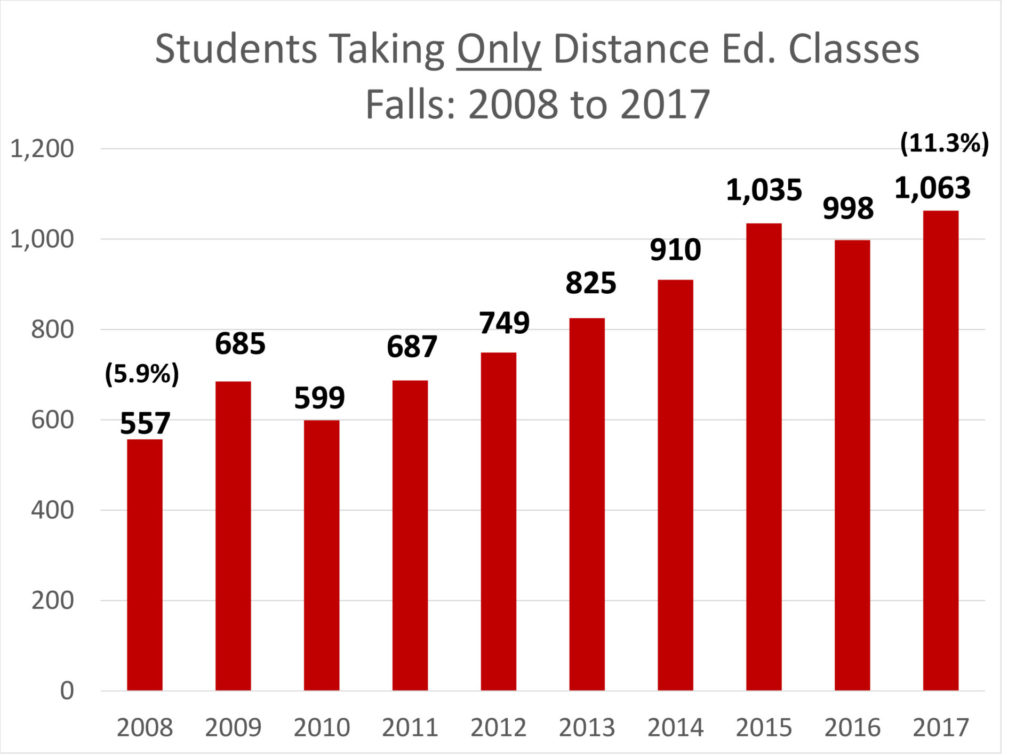Distance education has recently made big waves in Las Positas College’s curriculum. LPC offers two different kinds of distance education: online and hybrid courses.
A lot of the courses that LPC offers online are general education courses. However, there are some degrees and certificates that can be earned completely online. Christina Lee, an LPC counsel- or, said that both online and face-to-face classes have benefits. Lee stated, “There are some great online courses with excel- lent course design where the instructors are very involved in the course and students have active interactions with each other as well as with the instructors. There are also some great in-person classes where students can benefit from attending on campus.”
She added, “Now if a student tells me that s/he has poor time management, forgets to check information on Canvas and/or prefers to talk about topics with an instructor, I would never recommend that student take an online class. … I think online learning requires more reading and writing, so if a student is OK with that, very motivated and has excellent organizational and time management skills, I might recommend an online class to that student.”
Since online classes started being offered at LPC, the number of students enrolled in distance education classes has doubled. According to a chart tracking students enrolled in only online classes in fall semesters, there were only 557 students enrolled in 2008. This made up about 5.9% of the school’s overall population.
In the graph for 2017, that number shot up to 1,063 students enrolled, which made up about 11.3% of the school’s population.
Needless to say, online classes are progressively becoming more popular. This begs the question: Are online and hybrid classes an effective source of education?
According to the fall success and retention rates on the LPC website, fall 2018 had a success rate of 66%, the highest success rate for fall semesters to date. Then in the spring of 2019, the success rate rose to 71%. Similar to the fall semester trend, this is the highest success rate to date for spring semesters.
Retention rates for fall 2018 and spring 2019 were 81% and 85% respectively. This is significant because in the beginning there were low success rates. Overall, the college-wide success rate for all programs, online and physical classes included was 74.4% in the 2018-2019 school year. This was, again, the highest success rate to date. There may be a correlation between online success and overall college-wide success.
In a student survey administered in the fall of 2019, a large percentage of students marked “flexibility/convenience” as a reason why they chose online classes. Only 29% of students stated they could not come to campus, and 3% checked “disability” as a reason for taking classes online.
As far as satisfaction levels, only 44% of students felt “very satisfied” with the student to teacher interaction, and 30% were “satisfied.” The other 26% of students were either “unsatisfied” or “neutral.”
On the other hand, 60% of students noted they learned the same as in regular classes as they did online. 23% of the students even reported learning more content through online courses than they did in a physical classroom setting.
An additional survey measured the sentiment of the faculty. Out of the 31 staff members surveyed, 8 of them felt unsatisfied with student success in their online classes. Only 5 members were very satisfied, and 16 members were just satisfied.
Interestingly, when the survey asked faculty how they verify student’s integrity, 45% of members reported that they do not check.
Julian Betancourt, a current LPC student commented on the issue of online cheating, stating, “I personally do think that, yes, there is a percentage of students that do cheat in online courses. However, I would say it’s just a small percentage.”
He added, “There are quite a lot of blockades that a cheating student would have to go through. It just would not be worth the time or the effort for many to go through.”
Betancourt commented on distance education as a whole, saying, “I have to spend more time for classes on campus but spend more energy into online classes.” Betancourt noted that there wasn’t a huge difference between online and physical classes, stating, “To be honest, they’re quite the same.”
Since LPC has branched out more towards online and hybrid courses, there has been a rise in success rates not only just for online classes but college-wide as well. With more classes being added each year, there might be a continuous rise in success rates in the future.
Rebecca Robison is the news and campus life editor of The Express. Follow her @RebeccaRobiso19.



